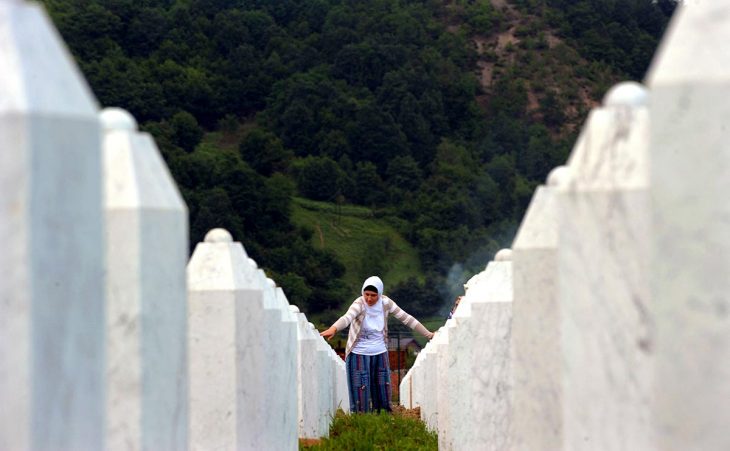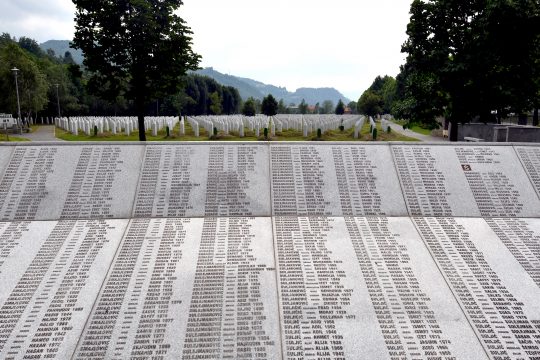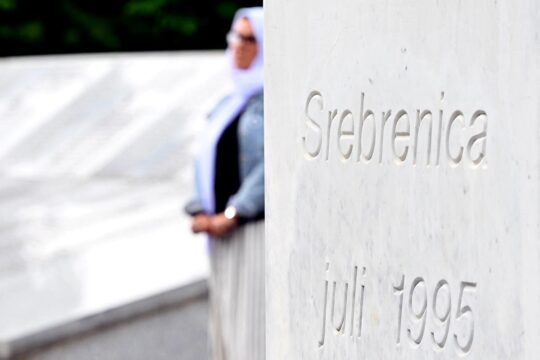National prosecution of war crimes in Bosnia and Herzegovina (BiH) was set in motion by the 2003 United Nations Security Council’s Resolution 1503, which outlined the completion strategy for the International Criminal Tribunal for the former Yugoslavia (ICTY). The resolution called “on the international community to assist national jurisdictions […] in improving their capacity to prosecute cases transferred from the ICTY”. More concretely, a Sarajevo-based special chamber within the State Court of Bosnia and Herzegovina was designated to adjudicate allegations of serious violations of international humanitarian law. The effort was not limited only to Bosnia but also extended to neighbouring countries, in particular Croatia and Serbia and Montenegro.
Prosecution of international crimes at the state level in Bosnia and Herzegovina (BiH) started in 2005. It was led by the war crimes department of the Court of BiH and by the Prosecutor’s Office of BiH. These two bodies until 2012 operated in a hybrid manner, with international judges and prosecutors working alongside nationals in both of them.
The National War Crimes Processing Strategy was adopted in late December 2008. It included war crimes, crimes against humanity and genocide. It aimed at dealing with the most complex cases by 2015 and completing the overall work by 2023. War crimes cases were allocated to the state court of BIH, in charge of prosecuting the main perpetrators, and to courts in the two entities that comprise Bosnia (the Federation of Bosnia-Herzegovina and the Republica Srpska), as well as the Brcko district.
Nearly 10,000 war crimes suspects
A total of 1,781 cases involving 9,879 persons suspected of war crimes were identified by the war crimes strategy in 2008. In addition, there were 2,692 cases where the perpetrators were unknown and 517 cases where it was not clear whether the case was a war crime. The strategy foresaw regional cooperation via memoranda of understanding amongst different prosecutors’ offices in BiH, Serbia and Croatia notably, but it left unaddressed some key issues such as possible perpetrators having dual citizenship or potential criminal prosecutions happening against the same individuals in more than one country.
One year after the adoption of the plan, a separate ad hoc working group started drafting a transitional justice strategy which was finalized but never adopted by the Council of Ministers (BiH government), mostly due to the disagreement of political parties representing the three main ethnic groups of Bosnia and Herzegovina. The transitional justice strategy was supposed to complement the war crimes strategy. It aimed at creating a sustainable platform for establishing facts about the past and, by developing a “never again” mentality, it sought to prevent the reoccurrence of conflict.
After the initial years, however, the war crimes strategy had to be revised. It was clear that at the existing pace, it was not possible to meet its ambitious goals and deadlines. In April 2017, the Council of Ministers tasked a working group for the purpose of drafting changes and amendments to the strategy. The working group completed its work in May 2018, providing a “Revised national strategy for war crimes processing”. The revised strategy acknowledged the fact that the initial deadline had passed already and it set the completion of all cases in Bosnia and Herzegovina, including the most complex ones, by the end of 2023.
A revised and delayed strategy
According to the revised strategy, in 2018, 780 cases involving 5,390 individuals remained pending before the different prosecutors’ offices, but it didn’t mention those cases already at the trial stage. While reiterating the commitment to complete all cases, it took stock of the fact that the actual mechanism for the allocation of cases to the different courts was not functioning and that in spite of previous commitments, resources for its implementation, including human resources, were still lacking.
It also acknowledged that regional cooperation remained a problem. While the most numerous and complex cases had taken place in Bosnia, neighbouring countries had adjudicated cases related to crimes that occurred in BiH, even if the bulk of evidence, victims and witnesses for those cases was in BiH. But the fact that many alleged perpetrators of crimes committed in Bosnia have either Croatian or Serbian citizenship prevented neighbouring countries from extraditing those persons to BIH even if they were indicted. Contacts and signed coordination agreements were insufficient to solve the problems.
Yet again increased political tensions that have characterized Bosnia for many years affected the implementation of the revised strategy. Prosecution of war crimes is a highly sensitive topic still. And as a result, the revised strategy was adopted by the BIH Council of Ministers only in September 2020, two and half years after it had been drafted. Even worse, due to political infighting, the new supervisory body, whose role had been strengthened in the revised strategy, has not been appointed up to now.
However the prosecution of war crimes is still considered as one of the key priorities for Bosnia and Herzegovina to walk its path towards European integration. In May 2019 the European Commission published its opinion on the membership application of BiH and it clearly referred to the issue of war crimes prosecutions and the backlog of cases. In addition, the creation of an environment conducive to reconciliation to overcome the legacies of the war was considered by the European Commission as one of the 14 conditions that the country should fulfill in order to hope becoming an EU member.
Hundreds of cases still pending
The Office of the Prosecutor of BiH and the Court of BiH provide only general information on their activities. There is no information available on the actual progress in the implementation of the revised strategy. The OSCE Mission to Bosnia and Herzegovina, however, has been closely following the domestic prosecution of war crimes and has released a number of reports on it.
The latest, published in June 2022, rang the alarm bell. Eighteen months before the announced date of completion of the strategy, progress has been insufficient and too slow, it said. At the current pace, it estimated that six more years will be needed to complete the work.
In the period 2004-2008, a total of 89 war crimes cases were finalized, concerning 136 defendants, an average of 18 cases per year. In the following decade (2009-2019), 555 cases (involving 842 defendants) were completed across the country - an average of around 55 cases per year. There are currently 245 ongoing cases before the courts of BIH. However, this is only a partial picture as it does not take into account the backlog of investigations at the different prosecutors’ offices. By end of 2021 the prosecutors’ offices had resolved 59% of the backlog of 1,210 investigations as registered in 2014 by the OSCE, and 495 investigations (for 4,284 potential suspects) were still pending. If indictments are confirmed in those cases, many could actually end up in the courts, adding to the existing backlog of ongoing trials.
The passing of time
The number of indictments has been decreasing constantly from 2014 to 2021. Besides the tempo of the completion of the strategy, the OSCE is concerned about a progressive deterioration in the quality of investigations and indictments. It stressed that the mechanism to identify less complex cases and allocate them to district courts has not really been implemented. It notes that the appointment of prosecutors doesn’t always follow merit criteria, but sometimes reflects the need to respect ethnic quotas.
In spite of the signed agreements and a number of joint activities, which are continuing to date, regional cooperation continued to suffer from politicization of cases and national sensitivities. Around 35% of the backlog of cases at the prosecutor’s offices and 38% of the trials pending before all BiH courts are affected by this situation. In 94 of 245 pending trials before the courts of BIH, around 100 defendants can’t be brought to court because they are in either Serbia or Croatia where they enjoy dual nationality.
The passing of time is another key factor that plays against the strategy: 30 years have passed since the beginning of the conflict. Victims and witnesses might have difficulty in recalling key details of the events or might just no longer be around to testify.
Increasing political tensions
While investigations, prosecutions and trials have been ongoing for decades and convictions have become a reality in Bosnia and Herzegovina, their impact on today’s life in the country remains unclear. Issues like the genocide in Srebrenica remain deeply divisive – with the Bosnian Serb and Serbian authorities persistently qualifying Srebrenica as a “terrible crime” rather than genocide. There have been a number of instances where streets and public buildings were named after war crimes defendants or convicted war criminals. War criminals themselves, after serving their sentence, do not shy away from public appearances either by freely addressing the public at political rallies or by running for public office in Bosnia.
In July 2021, the situation prompted the High Representative for Bosnia and Herzegovina – the international official overseeing the implementation of the 1995 peace agreement in Bosnia – to issue a decision criminalizing the denial and condonation of genocide, crimes against humanity and war crimes. His decision further exacerbated tensions in Bosnia with renewed calls to secession by the leaders of Republika Srpska (RS), the Bosnian Serb entity in BiH, and renewed fears of conflict. More recently, the city of Banja Luka, the main centre of RS, and numerous other RS municipalities financed a controversial movie by the Serbian-Canadian film maker Boris Malagurski, who portrayed the creation of Republika Srpska as a centuries-long “struggle for freedom” while omitting the war crimes that occurred in the region and caused the displacement of non-Serbs from Republika Srpska. The movie was accused by war victims associations of denying the genocide of Srebrenica and the crimes committed by Bosnian Serb forces. It also prompted several petitions across Europe to ban projections.
Is justice about prevention?
Last December, the UN Special Rapporteur on the promotion of truth, justice, reparation and guarantees of non-recurrence found it necessary to voice his concerns and urged Bosnian authorities to put an end to hate, denial of genocide and glorification of war crimes.
Divisive narratives, denial of war crimes and more or less open support to war criminals are very much present today in Bosnia and Herzegovina and in neighbouring Serbia. This is in spite of the fact that the prosecution of war crimes has been ongoing for almost 30 years. For many people in Bosnia, war criminals for one ethnic group are considered heroes by another ethnic group, regardless of criminal convictions by international or domestic courts. This reality questions what was stated in the national prosecution strategy that “preventing impunity and facing the recent war events is considered as one of the basic preconditions for the gradual reconciliation and progress of Bosnia and Herzegovina”. Even if the strategy is eventually completed, it will occur in isolation and will not be supported by a wider transitional justice strategy. Evidence suggests that its impact on national reconciliation will be deeply limited, whether there are six more years of trials or less.







